Abstract: Actualization of the 17 sustainable development goals (SDGs) conceived by the United Nations in 2015 is a global challenge that may not be feasible in sub-Saharan Africa by the year 2030, except higher education play a committed role. There is need for higher education to embrace partnership and train people on the concepts of sustainability and sustainable development in the region. This paper presents a model center with curricular framework and partnership structure for the training. The Model Center for Sustainability Studies (MCSS) will enable partnerships with institutions in Africa and in advanced nations, thereby creating a global network for sustainability studies not found in sub-Saharan Africa. MCSS will train and certify public servants, government agencies, policymakers, entrepreneurs and personnel from organizations and students on aspects of the SDGs and sustainability science. It is important to add sustainability into environmental education and make environmental education a compulsory course in higher institutions and a secondary school certificate exam subject in sub-Saharan Africa. MCSS has 11 training modules that can be replicated anywhere in the world. Higher institutions in sub-Saharan Africa should follow this training perspective, to achieved SDGs, predicted 2040 against 2030.
Continue Reading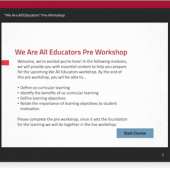
Abstract: Staff members play an important role in guiding students through living lab sustainability projects at Harvard University. Since there are significant opportunities for co-curricular learning in these settings, we created the “We Are All Educators” professional development workshop to empower those staff members to optimize and track student learning throughout these projects. In this case study, we will briefly summarize key principles of CCL and discuss its benefits as a tool for sustainability education in higher education. We will also describe our planning and implementation process for the workshop, the content of our training materials, and the results. Finally, we will end with key takeaways, as our workshop may be applicable to co-curricular learning in a variety of higher education contexts.
Continue Reading
Abstract: Industrial forms of food production and consumption are tied to environmental and socio-economic crises like climate change and social injustice. Changes in consumer behavior provide a lever to initiate transformations toward a more sustainable food system. One vehicle that is widely recognized as having the ability to encourage behavior change at large is education. Sustainability education has become increasingly popular over the past two decades, often being studied in innovative teaching-learning formats which employ transformative pedagogies that aim to foster critical consciousness through deep listening, dialogue, action, and reflection of students. However, classical teaching formats that employ more transmissive pedagogies, focused on delivery and mastery of content, have been comparatively little researched in the field of sustainability with regard to how they impact student behavior. Thus, this research aims to study if transmissive sustainability education can encourage university students to consume food more sustainably. To accomplish this, a case study with 12 undergraduate students in a food sustainability course was conducted. Mixed-methods data collection and analysis techniques, such as questionnaires and interviews, were utilized in order to track participants’ self-reported food consumption behaviors before, during, and after the course. Results suggest agreement among participants about the importance of course contents, but show no significant changes in their food consumption behaviors. The findings of this empirical study support the conclusion that imparting sustainability knowledge alone is insufficient to trigger behavior change.
Continue Reading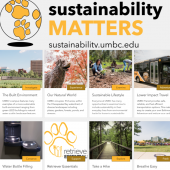
Abstract: Does the use of an interactive GIS web map significantly influence the level of sustainability stakeholder engagement at institutions of higher education? With over 1,000 institutions of higher education across the globe, the AASHE STARS report is one of the main tools available to sustainability professionals. For many institutions, the STARS report serves as a metric of sustainability progress and a source of new ideas and methods, while GIS provides a platform to display information within a context of systems, places, or times. Interactive web GIS allows for digital storytelling and can allow the user to explore specific information pertinent to their interests. This research explores potential links between the use of web GIS platforms and levels of campus engagement as measured by STARS.
Continue ReadingThe present study examined what undergraduate students thought they knew about climate change, what they actually knew in terms of scientific knowledge, and how these two types of knowledge predicted their pro-environmental intentions and behaviors. We tested these questions using a cross-sectional online survey and data from a subsample of undergraduate student participants who believe in anthropogenic climate change (N = 3,310). Students reported moderate levels of self-assessed knowledge yet objectively lacked an understanding of the causes of climate change. Self-assessed knowledge more strongly predicted pro-environmental intentions and action than actual knowledge. Students’ understanding of the consequences of climate change predicted intentions while understanding the causes and climate science predicted action. Students self-identified a lack of knowledge and a lack of prioritization as barriers to climate change mitigating action. Pedagogical implications are discussed.
Continue Reading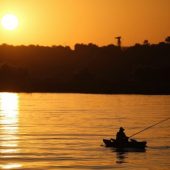
Abstract: This paper describes the outcomes of a game designed to teach advanced leadership skills, specifically influence and negotiation strategies, to current and aspiring sustainability professionals at Virginia Tech’s Center for Leadership in Global Sustainability. In the game, students assume the role of a key stakeholder and practice principle-based negotiation, conflict management, consensus building, and related influence skills needed by professionals working on complex sustainable development challenges such as the transboundary resource issues
regarding hydropower and watershed management. We collected pre- and post- survey data to assess the effectiveness of the simulation in developing students’ negotiation and influence skills. Results suggest that the training helps students develop confidence in using influence and negotiation skills and feel more competent and better prepared to serve as leaders in the field.
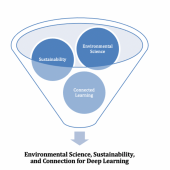
This comparative case study of teaching and learning experience explores connected learning design principles to improve engagement in higher education and weave sustainability practice into introductory environmental science curriculum through the integration of community, place, peer support, networking, and technology. For this study teaching and learning took place in multiple settings, online and in a brick-and-mortar classroom, and in students’ communities. We set out to ask: In what ways might the implementation of connected learning principles be used to improve engagement and weave sustainability into environmental science curriculum, broaden interest in science literacy, and encourage community action in introductory higher education courses? Comparative analysis and collaborative autoethnography methodologies were utilized to compare professor experiences for analysis and synthesis of patterns. Findings suggest that connected learning curriculum can broaden access to science, improve engagement, and help weave sustainability into a variety of courses by presenting students with relevant applied opportunities, connections and critical thinking about place and community, peer support and intergenerational connections, networking, and technology. Students can also gain a sense of agency and career relevance especially important to students who might otherwise feel they cannot “do science” or make a difference in a changing world. Lastly, this approach can improve instructors’ teaching experiences by relieving time and content constraints to incorporating sustainability into other course subjects as students submit more interesting passion-driven work, and are encouraged to network with and learn from individuals (family, community, and scientists) outside the classroom they may not have otherwise sought out.
Continue ReadingSustainable development and creative thinking have become central aspects of Higher Education in today’s multidisciplinary world. With the balance between learning and teaching priorities in mind, the Design Academy, Sichuan Fine Arts Institute and School of Design, Jiangnan University incorporated the author’s newly evolved teaching methodology — 3Ac: ‘Acknowledgment, Action and Accountability’ model of sustainable development and creativity — into its taught programs at all levels. The 3Ac model is a formative learning method for building the capabilities of individuals to create changes toward sustainable development. This paper first defines the 3Ac design methodology (Acknowledgment, Action, and Accountability) in the context of sustainable development and education: Acknowledgment is the appreciation and recognition of the importance of sustainable development in the face of global challenges, with a particular focus on team effort, co-design and sharing findings and practices. Action is the establishment of design strategy and action plans that consider not only the importance of intentions, goals, affordable and reachable resources but also a clear road map for achieving maximum efficiency when tackling the most challenging tasks. Accountability deals with a growing understanding of the benefits of working together to tackle global challenges such as Corporate Social Responsibility (CSR) practices. The framework aims to develop students’ capabilities through case studies of undergraduate, graduate and continuing professional development of young designers. Based on evidence from the feedback and evaluation of action research, the research team plans to further refine the 3Ac design teaching methodology and create a model that can be implemented and scaled effectively with collaborative partners from the community, business and local government.
Continue Reading
Abstract: A United Nations international collaboration between the Education for Sustainable Development (ESD) and the Principles for Responsible Management Education (PRME) resulted in the creation of Sulitest® (aka Sustainability Literacy Test) an open, online training and assessment tool freely available to higher education institutions globally. This study analyzes the effectiveness of the newly developed Sulitest® to not only measure sustainability literacy of higher education student populations, but also act as a catalyst for boosting affective learning outcomes by: (a) generating interest in sustainability-related issues, (b) improving sustainability-related understandings, and (c) enhancing students’ interests in the subject matter. In order to do so we present a two-phase, exploratory mixed-method pilot study. Preliminary results from this pilot study reveal Sulitest is a useful tool for not only assessing sustainability literacy but also spurring student interests and motivations in sustainability-related subject matters. Findings, discussion and limitations are provided.
Continue Reading
The purpose of this paper is to describe the application of a sustainable learning framework through a community-based project in the Southern California region. The Sage Project is a partnership between San Diego State University (SDSU) and a local government in San Diego, California. The framework promoted educational innovation by allowing students to utilize existing courses and focus on partner-identified real-world projects to help advance the needs of partnering cities. Recognizing the need for air quality research in the partner cities and after consulting with both local governments regarding their environmental needs, SDSU graduate students were able to conduct research and communicate their results concerning air quality in a manner that benefits local community stakeholders, as well as, the university and students involved. Through the assembly and quantification of air pollution data, graduate students provided a brief snapshot of air quality trends in partnering cities to establish a foundation of air quality results to be used toward generating mitigation strategies to reduce particulate matter air pollution. By providing never before conducted air quality research in both communities through a sustainable educational model, both community partners and students benefited through enhanced research and community engagement opportunities while community partners obtained valuable and informative research, ideas, and solutions concerning their community needs. This paper provides a demonstration of the ability for project-based curricula facilitated through a community and university partnership to be replicable in higher education coursework.
Continue Reading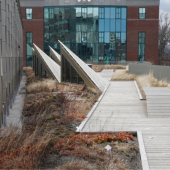
Abstract: Higher education campuses play an important role in developing visionary models of sustainability that integrate campus facilities, student learning, and research. We reflect on a series of visits to campuses within New York state utilizing systems thinking analysis of sustainable initiatives finding interconnections between buildings, pedagogy, and campus life. Campus infrastructure-systems, curriculum, and campus actors present agentic interconnections that contribute to teaching the campus community about sustainable systems. Our journey presents three big ideas for conceptualizing our encounters: wayfinding, defining occupancy, and implementing a vision that articulate how campus spaces and green infrastructures exert agency in teaching us about sustainable living. These big ideas are explored to conceptualize and reflect on our role as art and design faculty to use our workplace and hence campus life as a context within which to speculate on sustainable living.
Continue Reading
Abstract: In this article, we discuss the importance of Indigenous traditional ecological knowledge as the foundation of sustainability education, and we describe the need for, and successful efforts to, begin building an Indigenous Traditional Ecological Knowledge initiative at a research university. We share the guiding theoretical framework of our work, and the three goals of the initiative. We note the tensions involved in crafting a vision statement that a diverse group of faculty, staff, and students can all uphold in our collective work. We conclude with a description of our next planned steps for the initiative, and our hopes that this work will help decolonize sustainability education.
Continue Reading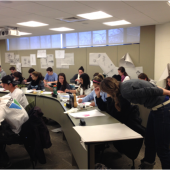
Engaging students not majoring in science, sustainability or environmental studies in learning environmental literacy and shifting their attitudes and behavior toward nature often requires a multi-perspective approach and presents unique challenges. We sought to: (1) pair artistic perspectives with botanical concepts to educate and interest our students in learning environmental literacy, (2) engage our students in careful observation and visualization of nature, and (3) increase the environmental sensitivity of our students by connecting botany with nature based art. To do this we designed a pre-class assignment, an in-class botanical art workshop, and a written reflection assignment that asked students to view, conceptualize, and create works of botanical art as a multi-perspectival process of engaging with relevant scientific processes and environmental concerns connected to botany. Here we provide a justification for the value of bridging science with art, detail our approach, describe student survey responses and thoughtful written reflections, and illustrate lessons learned and future plans.
Continue Reading
Abstract: This study sought to determine the influence of environmentally themed higher education courses upon students’ self-perceptions of their environmental literacy. Past research has suggested mixed conclusions about the objectives, approaches, and impacts of environmental and sustainability education in higher education. This study assessed environmental literacy and the influence of pedagogical perspective and instructor emphasis in environmentally themed higher education courses. Using the Hollweg et al. (2011) framework for environmental literacy, the study assessed students’ self-perceptions of their environmental literacy in a pre- and post-test format. Data were analyzed using a paired samples t-test and one-way ANOVA with a Tukey HSD post-hoc test. The results of the study showed that environmentally themed higher education courses are having a significant influence on students’ self-perceptions of their environmental literacy. However, instructors seemed to emphasize behavior least of the four aspects of environmental literacy. These findings suggest that environmentally themed courses are having a strong impact, yet further integration of environmental education principles may be meaningful. This study clarifies the impact of environmentally themed higher education courses. The distinction between pedagogical perspectives delineates new understandings of the differences in environmental literacy change. This study serves as a ground for future research to build the implementation of environmental education in higher education.
Continue ReadingIn 1999, the National Association of Social Workers (NASW) in the United States published a policy statement on the environment that acknowledged the social work profession’s apparent “lack of interest” in environmental issues, and called for a new urgency among social workers to address the challenges of pollution, environmental contamination, and resource depletion. Despite this call for urgency and the increasing certainty of widespread social and environmental crises due to climate change, the integration of ecological concepts into mainstream social work education and practice has been slow and sporadic. Only recently have some social workers begun to openly discuss a re-centering of social work within a sustainability paradigm, emphasizing the importance of interconnectedness among humans and the natural world, interdisciplinary alliances and partnerships, and holistic justice-focused practice. This paper explores the potential for a case study assignment in a Master of Social Work (MSW) program to help make explicit connections between sustainability concepts introduced in the classroom and the practical application of these concepts in a wide range of social work practice settings. Three sample case studies from students are presented, and advantages and challenges of this pedagogical approach are discussed.
Continue Reading
Abstract: Geography supports place-based inquiry for the learner, applying the old environmental adage of “think globally, act locally” to environmental problem solving. Many within and outside of the discipline of geography see it as a highly appropriate home for sustainability studies. Yet despite a history of human-environment education, place-based relevancy, and support from professional research or education organizations, studies show that geography does not always take a lead role in sustainability education. In the following, we revisit the contested histories of geography and sustainability education and show support for geography-led sustainability curriculum. The scope of this research is universities which have self-identified as leaders in campus sustainability, using the Association for the Advancement of Sustainability in Higher Education (AASHE) Sustainability Tracking, Assessment, and Rating System (STARS) participation as an indicator. To best understand the current relationship of geography and sustainability studies in higher education, this study examines the role of geography in offering “Sustainability Focused” courses as reported by AASHE STARS institutions with geography programs. The results show that although geography departments are highly utilized when present at an institution, there is still much room for improvement both within geography departments and campus-wide. We then discuss the implication of these findings, both for the discipline of geography and for students of sustainability.
Continue ReadingChronicling a semester-long civic engagement project, this essay explores the efforts of a senior seminar course to collaborate with a local wilderness preservation organization. The essay reflects on the role of students in their communities, their connections to wilderness, and the challenges and rewards of civic engagement.
Continue Reading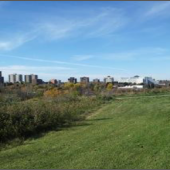
This paper provides a descriptive analysis of the experience of four doctoral students engaged in a collective project of place exploration at a midsize Canadian university. Under the methodological tradition of self-study, we contextualize concepts of place attachment and decolonization in order to investigate what it means to be interdisciplinary scholars of sustainability. We use storytelling and mobile discussion methods, alongside visual and mapping methods to disentangle our experiences and analyses of place, mobility, land, and scholarship. This reflective piece demonstrates that collaborative forms of scholarship such as this require deliberate moves toward community creation and place attachment within institutions of higher education. Through a process of collaborative investigation and writing, we have created spaces of caring academic scholarship rather than engaging in competitive and hierarchical university culture.
Continue Reading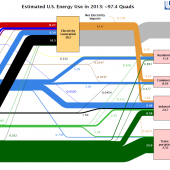
Energy services undergird all modern, industrial societies, yet economies based on fossil fuels are not sustainable. Insecurity of supply, particularly of oil, has sparked major geopolitical tensions and warfare. Pollution from use of fossil fuels and other energy sources has damaged local, regional, and global health. Greenhouse gases from fossil fuels have triggered concerns about the earth’s climate. Educational institutions are responding only slowly to these existential threats. This paper addresses the challenges facing students, faculty, and administrators as institutions move from simply providing technical education on the respective components of the energy industries to a more comprehensive program that also addresses the environmental, political, economic, cultural, and ethical contexts of energy literacy. Students at most institutions lack courses and programs outside of engineering and physical science. Only 8 percent of 1638 institutions have systematic, broad-based energy studies. The U.S. Department of Energy has supported initial efforts to develop this field. Development includes helping students move from energy studies to employment. Nevertheless, student interest is high. Faculty teaching sustainable energy have generally self-taught, and faculty employment opportunities in energy studies seldom exist. A faulty member delivering energy studies generally lacks a community of supporting peers. Those in this interdisciplinary field may fear the effort will not be rewarded by the institution. Nevertheless the intellectual rewards from developing energy studies are significant and motivating. Administrators face questions of balancing competing claims for institutional resources and face criticism from internal and external constituencies. In addition, they must guide the institution to promoting, enabling, and rewarding interdisciplinary work. Development of energy studies, however, positions the institution for better internal operations and for meeting critical societal needs. We conclude that energy education is both easy and hard, but it can and must be done.
Continue Reading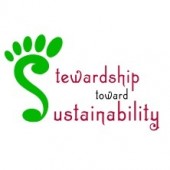
There are unique challenges in sustainability education that many in administrative and decision-making positions may not fully understand. While there is a general movement toward interdisciplinary curriculum design in colleges and universities, what may truly be needed to effectively address sustainability issues is trans-disciplinary curriculum design. Using my experience in creating the Stewardship Toward Sustainability certificate program at Ferrum College as a launch point, I discuss solutions to overcoming conceptual and political barriers in this process.
Continue Reading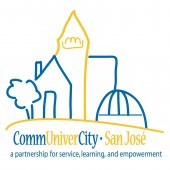
Experiential learning, and more specifically, service learning (SL) can serve as an ideal mechanism to support sustainability education. In particular, because of its emphasis on collaboration between students, faculty, and the community partner(s) and on social change and civic engagement, SL provides an excellent vehicle to address issues related to social justice. In this article, we document a unique SL partnership at San José State University—CommUniverCity. CommUniverCity’s primary mission is to build social capital and empower residents in an underserved community near the university. Each year, students, faculty and residents invest more than 21,000 hours in service to the community. Because of its unique mission, sustainability-related projects lie at the heart of what CommUniverCity does. We analyze student surveys from more than 30 classes engaged in SL projects during 2012 across a wide range of disciplines. All projects address at least one, and often multiple “Es” of sustainability. Our findings indicate that students find value in the SL experience, not only in terms of better understanding of the course subject matter, but also in terms of their understanding of “community” and the larger issue of social justice and equity.
Continue Reading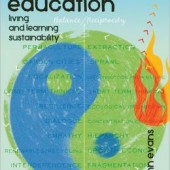
Mark Seis review of Tina Evans book helps us see the power of Evans’ approach to using critical social theory as a vehicle for dissecting out how higher education might really work towards true sustainability. Evans’ book takes on a giant task and delivers a strong call for deeply analyzing the capitalist and materialist forces that dominate higher education so that a truly transformative sustainable education process can be constructed.
Continue Reading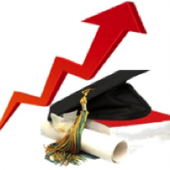
PDF: Maragakis and van den Dobbelsteen Winter 2013 Abstract: The progress of sustainability within higher education has steadily increased in focus over the last decade and has increasingly become a topic of academic research. With various scholars, journals and conferences exclusively dealing with the subject, a wealth of literature has been produced on best practices, […]
Continue Reading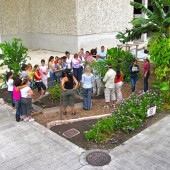
In this fascinating case study from Miami Dade College, Anouchka provides us with a detailed and subtle look at the effects of a simple school garden on her students. The garden’s potential to build a sense of community and place as well as a new environmental ethic is developed through vivid vignettes woven throughout the description of how Anouchka and her colleagues launched the project. The garden project described is a powerful example of complex, interdisciplinary teaching that also takes advantage of the college’s physical campus to foster experiential learning and cultural exchange. Whether or not readers are involved in similar projects, this story is important for its illustration of the interconnectivity and endless learning possible in any discipline from a connection to the living earth.
Continue Reading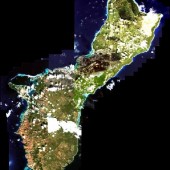
Graduate students enrolled in an education research course (many of the students were school teachers) that the author taught during the spring 2010 semester participated in this “green” course project. Those students who were not school teachers, who worked for private companies or government agencies, focused their projects on green communities, workplaces, or households. Students conducted their projects based on inquiry-based learning, and this sustainability study reported in the current paper itself derives from an inquiry-based approach. The results from this study demonstrated that daily curricular activities at universities and schools provide an important way to support environmentally responsible living. Implementing green course projects similar to the one described here is one of many ways in which university teachers can incorporate “sustainability” into their curricula.
Continue Reading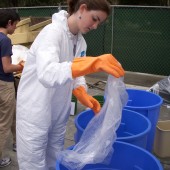
In this well-formulated case study, Miller and Close show us how student involvement and action through a group independent study course led to sophisticated analysis and real change in the handling of waste at Pomona College. They make a good case for student analysis to have equaled or better what experts might have done, with the added benefit of giving students an impactful, real-life experience with practical solutions to sustainability education problems.
Continue Reading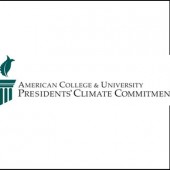
Anthony Cortese and Richard Cook’s clarion call for colleges to join the Presidents’ Climate Commitment lays out the stakes in no uncertain terms. They succinctly define what sustainability education really means in terms of every-day concrete changes for which every institution of higher learning should strive.
Continue Reading
In this convincing argument, Tina Evans makes the case for both social and ecological components to sustainability that each of us realize, individually and in community, in the context of our own “lifeway.” She also portrays, in concise terms, the transformational process that she incorporates into her own lifeway as a college professor.
Continue Reading